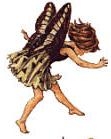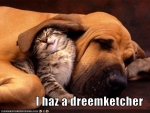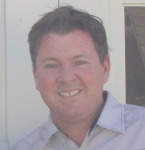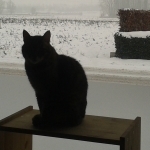Insomnia discussed at last night's Manhattan A.W.A.K.E. mtg.
Insomnia discussed at last night's Manhattan A.W.A.K.E. mtg.
At last night’s Manhattan A.W.A.K.E. meeting, Dr. Marta Maczaj (Clinical Associate Professor at NYU’s Department of Psychiatry) gave an informative presentation on the subject of insomnia. Following is my summary of some things I learned.
True primary insomnia, in which there appears to be a genetic predisposition to sleeplessness, is rare. But the term “insomnia” is used to describe people’s difficulties (1) falling asleep, (2) staying asleep, and (3) getting restorative sleep.
Insomnia is almost always a symptom of something else. For example, acute insomnia is commonly due to stress. It is useful to nip such stress-related sleep problems in the bud whenever possible, since chronic insomnia (sleep disturbance for longer than one month) is difficult to treat.
The results of chronic insomnia can be catastrophic, since the person may not be aware of how seriously alertness and performance have become diminished. Microsleeps lead to amnesia, mood impairment, and strange behaviors that can, in turn, lead to accidents and other serious consequences.
Chronic insomnia can have multiple factors, such as aging, sickness, medications, and sleep disorders, but the most common cause is long-term behavioral conditioning. Therefore, sedatives and hyponotics are not the first-line treatment.
It used to be taught that depression causes sleeplessness; now it is more commonly held that sleeplessness causes depression.
Some of the common underlying sleep disorders that contribute to chronic insomnia are OSA, CSA, RLS, PLMD, and circardian rhythm disorders. Treating the common problem of delayed sleep phase syndrome often involves a combination of (1) very strict enforcement of regularity of wake-up time (which turns out to be much more important than the time for going to bed); (2) use of light therapy; and (3) melatonin.
A few of the medications that commonly cause chronic insomnia are thyroid medications, beta blockers, oral contraceptives, and some antidepressants (other antidepressants can be used to treat insomnia). The time of day that the medication is taken can make a big difference. For example, it may help for thyroid medications and some antidepressants to be taken in the morning to prevent sleeping problems. It depends on the patient.
Patients need to be educated about the importance of sleep hygiene, the effects of caffeine (the stimulant effect can last 12 hours), and the problem of having alcohol within four hours (roughly) of bedtime. Some practical measures for the patient to take: Don’t go to bed until sleepy; if not asleep in 15 minutes, go to another room, engage in boring activities, and then return to bed when drowsy; don’t look at the clock; get up at the same hour, no matter how bad the sleep; no napping.
CBT and relaxation techniques are useful to some.
In severe cases, sleep-restriction therapy is the only recourse. This hard-line approach involves restricting time in bed to actual sleep time, even if only three hours, for about a week, then slowly adding 15 minutes a week (or so) to bed time to match actual sleep time until the bedroom is sufficiently reassociated with sleep. This illustrates why going to bed early when one is not sleepy is counterproductive in that it allows the bed to become associated with sleeplessness rather than sleep.
Medications can be used to treat chronic or acute insomnia. Details on important considerations can be found in slides 32 to 50 from Dr. Maczaj’s presentation, located here: http://manhattanawake.org/download/18
Typo corrected: "diminished," not "dimished."
True primary insomnia, in which there appears to be a genetic predisposition to sleeplessness, is rare. But the term “insomnia” is used to describe people’s difficulties (1) falling asleep, (2) staying asleep, and (3) getting restorative sleep.
Insomnia is almost always a symptom of something else. For example, acute insomnia is commonly due to stress. It is useful to nip such stress-related sleep problems in the bud whenever possible, since chronic insomnia (sleep disturbance for longer than one month) is difficult to treat.
The results of chronic insomnia can be catastrophic, since the person may not be aware of how seriously alertness and performance have become diminished. Microsleeps lead to amnesia, mood impairment, and strange behaviors that can, in turn, lead to accidents and other serious consequences.
Chronic insomnia can have multiple factors, such as aging, sickness, medications, and sleep disorders, but the most common cause is long-term behavioral conditioning. Therefore, sedatives and hyponotics are not the first-line treatment.
It used to be taught that depression causes sleeplessness; now it is more commonly held that sleeplessness causes depression.
Some of the common underlying sleep disorders that contribute to chronic insomnia are OSA, CSA, RLS, PLMD, and circardian rhythm disorders. Treating the common problem of delayed sleep phase syndrome often involves a combination of (1) very strict enforcement of regularity of wake-up time (which turns out to be much more important than the time for going to bed); (2) use of light therapy; and (3) melatonin.
A few of the medications that commonly cause chronic insomnia are thyroid medications, beta blockers, oral contraceptives, and some antidepressants (other antidepressants can be used to treat insomnia). The time of day that the medication is taken can make a big difference. For example, it may help for thyroid medications and some antidepressants to be taken in the morning to prevent sleeping problems. It depends on the patient.
Patients need to be educated about the importance of sleep hygiene, the effects of caffeine (the stimulant effect can last 12 hours), and the problem of having alcohol within four hours (roughly) of bedtime. Some practical measures for the patient to take: Don’t go to bed until sleepy; if not asleep in 15 minutes, go to another room, engage in boring activities, and then return to bed when drowsy; don’t look at the clock; get up at the same hour, no matter how bad the sleep; no napping.
CBT and relaxation techniques are useful to some.
In severe cases, sleep-restriction therapy is the only recourse. This hard-line approach involves restricting time in bed to actual sleep time, even if only three hours, for about a week, then slowly adding 15 minutes a week (or so) to bed time to match actual sleep time until the bedroom is sufficiently reassociated with sleep. This illustrates why going to bed early when one is not sleepy is counterproductive in that it allows the bed to become associated with sleeplessness rather than sleep.
Medications can be used to treat chronic or acute insomnia. Details on important considerations can be found in slides 32 to 50 from Dr. Maczaj’s presentation, located here: http://manhattanawake.org/download/18
Typo corrected: "diminished," not "dimished."
Last edited by jnk on Thu Sep 02, 2010 11:08 am, edited 1 time in total.
- dreamchaser
- Posts: 26
- Joined: Fri Jul 09, 2010 10:29 am
- Location: Lillian, Al.
Re: Insomnia discussed at last night's Manhattan A.W.A.K.E. mtg.
Thanks for the info. It was quite interesting.
_________________
| Mask: Mirage Quattro™ Full Face CPAP Mask with Headgear |
| Additional Comments: Pressure set at 12 |
- rested gal
- Posts: 12881
- Joined: Thu Sep 09, 2004 10:14 pm
- Location: Tennessee
Re: Insomnia discussed at last night's Manhattan A.W.A.K.E. mtg.
Thanks, Jeff. Great report!
Fortunately I've never had insomnia. Must be absolutely miserable for those that do.
Fortunately I've never had insomnia. Must be absolutely miserable for those that do.
ResMed S9 VPAP Auto (ASV)
Humidifier: Integrated + Climate Control hose
Mask: Aeiomed Headrest (deconstructed, with homemade straps
3M painters tape over mouth
ALL LINKS by rested gal:
viewtopic.php?t=17435
Humidifier: Integrated + Climate Control hose
Mask: Aeiomed Headrest (deconstructed, with homemade straps
3M painters tape over mouth
ALL LINKS by rested gal:
viewtopic.php?t=17435
Re: Insomnia discussed at last night's Manhattan A.W.A.K.E. mtg.
Thanks from me too Jeff for this report from the meeting. What I find refreshing is that this doctor seems to really "get it". A few points you noted that stand out to me are...
Kathy
jnk wrote:Insomnia is almost always a symptom of something else.
jnk wrote:The results of chronic insomnia can be catastrophic...
jnk wrote: ...sedatives and hyponotics are not the first-line treatment.
Hopefully Dr. Marta Maczaj is influential in bringing others in the field into the current thinking. Thanks again, Jeff. I appreciate the time and effort you invested in attending, noting, and making available those things you learned that will surely be helpful to some here, especially to those whose well being has been negatively affected by doctors not so enlightened.jnk wrote:It used to be taught that depression causes sleeplessness; now it is more commonly held that sleeplessness causes depression.
Kathy
_________________
| Mask: TAP PAP Nasal Pillow CPAP Mask with Improved Stability Mouthpiece |
| Humidifier: S9™ Series H5i™ Heated Humidifier with Climate Control |
| Additional Comments: Bleep/DreamPort for full nights, Tap Pap for shorter sessions |
My SleepDancing Video link https://www.youtube.com/watch?v=jE7WA_5c73c
Re: Insomnia discussed at last night's Manhattan A.W.A.K.E. mtg.
Thanks Jeff, very interesting and cutting edge.
_________________
| Mask: Pico Nasal CPAP Mask with Headgear |
| Additional Comments: Resmed AirCurve 10 ASV and Humidifier, Oscar for Mac |
KatieW
Re: Insomnia discussed at last night's Manhattan A.W.A.K.E. mtg.
Wow, thanks for gathering all the informtion and making this great report.
edit: wondering about the three hours per week, but it must be three hours per night..
thanks!
elena
edit: wondering about the three hours per week, but it must be three hours per night..
thanks!
elena
_________________
| Mask: Swift™ FX Nasal Pillow CPAP Mask with Headgear |
| Humidifier: S9™ Series H5i™ Heated Humidifier with Climate Control |
| Additional Comments: sleep study: slept 66 min in stage 2 AHI 43.3 had 86 spontaneous arousals I changed pressure from 11 to 4cm now no apap tummy sleeping solved apnea |
Re: Insomnia discussed at last night's Manhattan A.W.A.K.E. mtg.
Thanks, elena88; I worded that badly.elena88 wrote:wondering about the three hours per week, but it must be three hours per night.
As I understand it, if the patient is only getting about three hours of sleep scattered throughout the night, and the patient gets up at 6:00 am, then they ask the patient not to go to bed until 3:00 am. It seems to take at least a week, but once the patient can sleep the three hours straight (from sleep deprivation, I assume), then they have the patient go to bed at 2:45, until the patient sleeps that amount of time. If the patient can stay asleep that long each night after a week, then they have the patient go to bed at 2:30, and so on, until the patient can sleep all night, every night, for the length of time needed for healthy sleep for that patient.
Sounds brutal to me. But I guess it must work for some. I am sure there are variations to the method. I assume that the principle of the thing may be more important than the specific application of the idea.
Re: Insomnia discussed at last night's Manhattan A.W.A.K.E. mtg.
insomia not genetic?have these drs ever heard of FFI?this type of insomia kills.it is rare and genetic.
_________________
| Mask: Mirage Quattro™ Full Face CPAP Mask with Headgear |
| Additional Comments: pressure 17 |
Re: Insomnia discussed at last night's Manhattan A.W.A.K.E. mtg.
I did not hear a doctor say that.tony72 wrote: insomia not genetic?
Yes. That is what the doctor said, as I heard her: "It is rare."tony72 wrote:have these drs ever heard of FFI?this type of insomia kills.it is rare and genetic.
Re: Insomnia discussed at last night's Manhattan A.W.A.K.E. mtg.
I trying to practice the techniques described in the book sound sleep sound mind to help me close out my day and bring on the natural wave of sleep without using Rx drugs, melatonin or alcohol. Its making sense so far i just need more practice.
http://www.amazon.com/Sound-Sleep-Mind- ... 35&sr=8-1.
http://www.amazon.com/Sound-Sleep-Mind- ... 35&sr=8-1.
Re: Insomnia discussed at last night's Manhattan A.W.A.K.E. mtg.
Thanks very much for the info! Ditto to all that kteague said (esp. the 4th quote).
PR System One APAP, 10cm
Activa nasal mask + mouth taping w/ 3M micropore tape + Pap-cap + PADACHEEK + Pur-sleep
Hosehead since 31 July 2007, yippie!
Activa nasal mask + mouth taping w/ 3M micropore tape + Pap-cap + PADACHEEK + Pur-sleep
Hosehead since 31 July 2007, yippie!
Re: Insomnia discussed at last night's Manhattan A.W.A.K.E. mtg.
Thank you, jeff.
_________________
| Mask: AirFit™ P10 Nasal Pillow CPAP Mask with Headgear |
| Additional Comments: Machine: Resmed AirSense10 for Her with Climateline heated hose ; alternating masks. |
And now here is my secret, a very simple secret; it is only with the heart that one can see rightly, what is essential is invisible to the eye.
Antoine de Saint-Exupery
Good advice is compromised by missing data
Forum member Dog Slobber Nov. 2023
Antoine de Saint-Exupery
Good advice is compromised by missing data
Forum member Dog Slobber Nov. 2023













